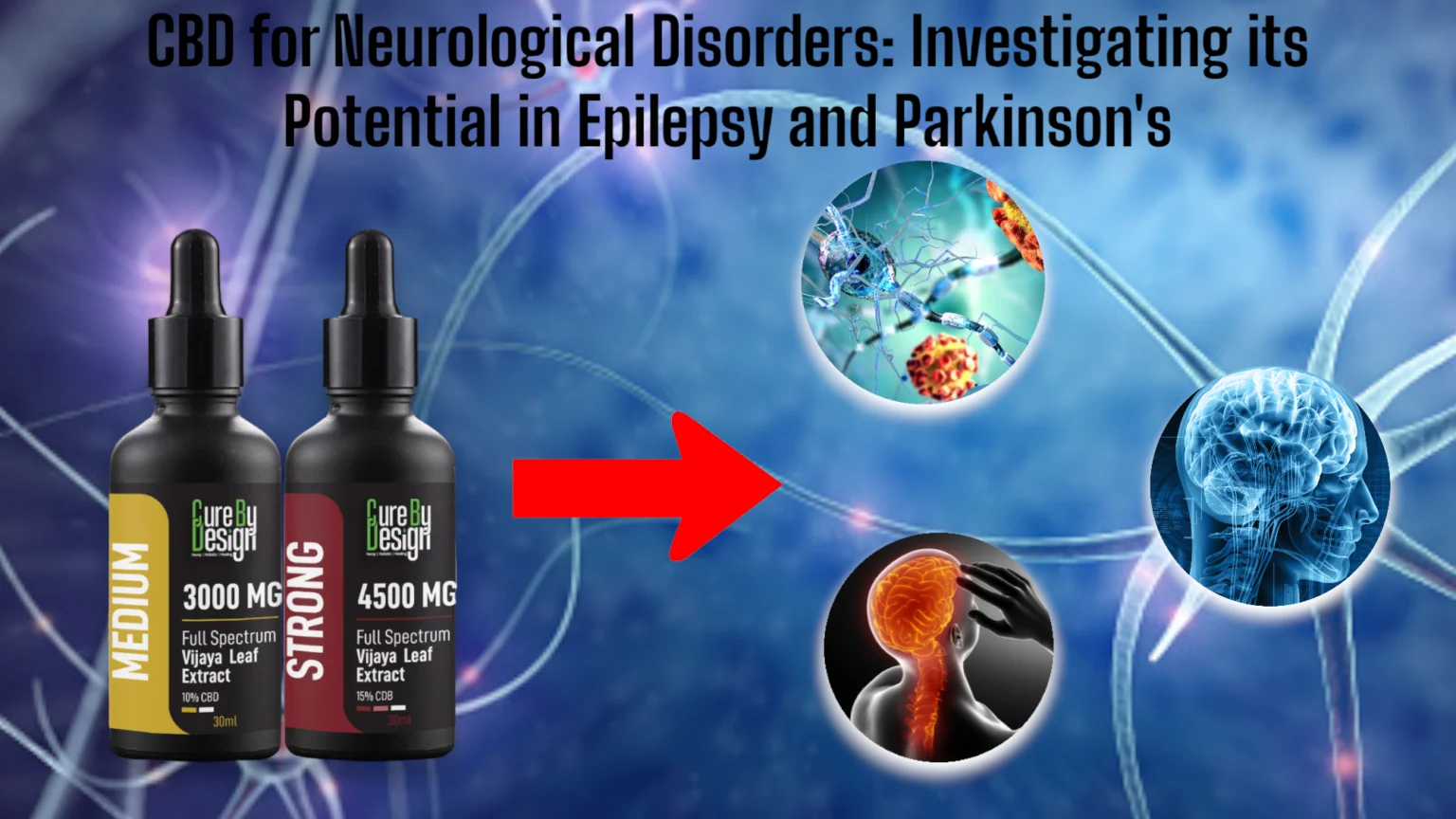
Blog
CBD for Neurological Disorders: Investigating its Potential in Epilepsy and Parkinson’s

CBD, short for cannabidiol, is a natural compound found in cannabis plants that has garnered significant attention in recent years for its potential health benefits. While the research on CBD is still in its early stages, there is growing evidence suggesting its positive effects on neurological disorders like epilepsy and Parkinson’s disease. In this blog, we will explore the promising potential of CBD in managing these neurological conditions and how it works to alleviate symptoms. Additionally, we will discuss the availability of high-quality CBD products online in India, with a special focus on Cure By Design’s offerings.
Understanding Neurological Disorders: Epilepsy and Parkinson’s
Epilepsy is a chronic neurological disorder marked by recurrent seizures, which result from abnormal electrical activity in the brain. While traditional treatment approaches for epilepsy primarily involve antiepileptic drugs, these medications may not be effective for everyone and can come with notable side effects. As a result, researchers have become intrigued by CBD’s anticonvulsant properties, prompting investigations into its potential as an alternative treatment option for epilepsy. By studying CBD’s effects on seizure activity, scientists aim to shed light on its therapeutic potential in managing this complex condition.
Parkinson’s disease is a progressive neurological disorder characterized by the gradual loss of dopaminergic neurons in the brain, leading to movement impairments. Common symptoms of Parkinson’s include tremors, stiffness, bradykinesia (slowness of movement), and difficulties with balance. Although there is currently no cure for Parkinson’s, available treatments aim to manage symptoms and enhance patients’ overall well-being. Recent research into CBD has shown promising results, suggesting that it may possess neuroprotective properties. These findings have sparked interest in investigating CBD’s potential in slowing the progression of Parkinson’s disease and alleviating some of its symptoms. By exploring the therapeutic benefits of CBD, scientists hope to provide new insights into managing this complex neurological disorder.
How does CBD work? The endocannabinoid system (ECS) is a complex regulatory system that exists in all mammals, including humans, and plays a vital role in maintaining homeostasis within the body. CBD, or cannabidiol, interacts with the ECS by influencing its receptors, specifically CB1 and CB2, which are found throughout the brain and body. Through its interaction with these receptors, CBD has the potential to modulate various neurological functions and processes. This suggests that CBD may offer therapeutic effects for neurological disorders by impacting the ECS and promoting balance within the body. As research into CBD and its effects on neurological conditions continues to expand, there is growing interest in its potential as a natural treatment option for individuals with neurological disorders. Here are some benefits of using CBD,
Neurological disorders are complex conditions that can involve oxidative stress and inflammation, resulting in damage to nerve cells. One intriguing aspect of CBD is its antioxidant and anti-inflammatory properties, which may hold promise for addressing these underlying factors. Oxidative stress occurs when there is an imbalance between free radicals and antioxidants in the body, leading to cell damage. CBD, as a powerful antioxidant, has the potential to counteract this oxidative stress by neutralizing free radicals and reducing cellular damage in the brain.
In addition to its antioxidant activity, CBD also possesses anti-inflammatory properties. Inflammation plays a significant role in the progression of many neurological disorders, contributing to the destruction of neurons and the worsening of symptoms. CBD’s ability to reduce inflammation in the brain may help mitigate this harmful process, potentially preserving the integrity of nerve cells and promoting healthier neurological function.
Furthermore, CBD has demonstrated neuroprotective effects in preclinical studies, indicating its potential to shield brain cells from damage and degeneration. This property is particularly relevant for neurodegenerative disorders such as Parkinson’s disease, where the gradual loss of dopaminergic neurons leads to motor impairments and other symptoms. By acting as a neuroprotectant, CBD could potentially slow down the progression of neurodegenerative diseases, offering a promising avenue for therapeutic intervention.
Although further research is needed to fully understand the mechanisms underlying CBD’s antioxidant, anti-inflammatory, and neuroprotective effects, the existing preclinical evidence is encouraging. These findings have led to increased interest in exploring CBD’s potential as a therapeutic option for various neurological disorders. The ability of CBD to target multiple aspects of these conditions, such as oxidative stress, inflammation, and neuronal protection, makes it a promising candidate for further investigation.
As the research continues to evolve, CBD’s neuroprotective properties and their potential application in neurological disorders like Parkinson’s disease hold significant promise. However, it’s essential to note that while CBD shows therapeutic potential, it should be approached as a complementary treatment and used under the guidance of healthcare professionals. Moreover, the quality and dosage of CBD products can vary, emphasizing the importance of sourcing from reputable brands like Cure By Design. With CBD’s antioxidant, anti-inflammatory, and neuroprotective properties, it is an intriguing area of exploration for the potential improvement of neurological disorders and enhancing the quality of life for those affected.
CBD for Epilepsy: Investigating the Evidence
The efficacy of CBD in treating epilepsy has been investigated through various clinical trials and case studies, shedding light on its potential therapeutic benefits. Researchers have specifically focused on patients with treatment-resistant forms of epilepsy, where conventional treatments have proven ineffective. The findings from these studies have been encouraging, demonstrating a significant reduction in both the frequency and severity of seizures among participants.
One notable milestone in the recognition of CBD’s therapeutic potential for epilepsy is the approval of Epidiolex by the U.S. Food and Drug Administration (FDA). Epidiolex is a CBD-based medication that has received FDA approval for the treatment of specific types of epilepsy, including Lennox-Gastaut syndrome and Dravet syndrome. This approval signifies a crucial step in acknowledging CBD as a legitimate and effective treatment option for epilepsy.
The clinical trials and FDA approval of Epidiolex have provided substantial evidence supporting the use of CBD in managing epilepsy. These developments have instilled hope in both patients and healthcare professionals, offering a new avenue for individuals who have not responded well to traditional treatment approaches. CBD’s ability to reduce seizure frequency and severity offers a promising alternative for those with treatment-resistant epilepsy, potentially improving their quality of life and providing relief from the debilitating effects of seizures.
However, it is essential to note that while CBD has shown promise in treating epilepsy, it should always be used under the guidance and supervision of healthcare professionals. Each patient’s condition is unique, and individual responses to CBD may vary. Working closely with medical experts ensures appropriate dosing and monitoring to achieve the best possible outcomes.
The emergence of clinical trials, case studies, and the FDA’s approval of Epidiolex have propelled CBD into the spotlight as a potential game-changer in epilepsy treatment. As research in this area continues to evolve, it holds promise not only for individuals with epilepsy but also for advancing our understanding of how CBD may benefit other neurological disorders. The recognition of CBD’s therapeutic potential for epilepsy is a significant step forward, highlighting the importance of continued research and exploration into the applications of CBD in neurological conditions.
Cure By Design is a trusted brand that provides access to high-quality CBD products in India. Their commitment to quality is evident through their rigorous testing processes, ensuring that their products are pure, potent, and safe for consumption. By adhering to strict quality standards, Cure By Design aims to deliver reliable and effective CBD products to their customers.
One of the key advantages of Cure By Design is the convenience of purchasing their CBD products online. With just a few clicks, individuals in India can explore the potential benefits of CBD for neurological disorders from the comfort of their own homes. This online availability eliminates the need to visit physical stores, making it easier for customers to access the CBD products they need.
By offering their CBD products online, Cure By Design caters to the growing demand for CBD in India. This accessibility opens up opportunities for individuals seeking alternative solutions for neurological disorders to explore the potential benefits of CBD. Whether it’s for managing epilepsy, Parkinson’s disease, or other neurological conditions, Cure By Design’s online platform provides a convenient and reliable avenue to explore the potential therapeutic effects of CBD.
With Cure By Design’s commitment to quality and their online availability, individuals in India can confidently explore CBD as a potential treatment option for neurological disorders. It is important to consult with healthcare professionals before incorporating CBD products into any treatment plan to ensure proper usage and dosage. By providing high-quality CBD products and easy online access, Cure By Design supports individuals in their journey towards finding alternative solutions for neurological disorders.
While the research on CBD’s effects on neurological disorders is still evolving, the growing body of evidence suggests its potential as a complementary or alternative treatment option for conditions like epilepsy and Parkinson’s disease. CBD’s interaction with the endocannabinoid system, its antioxidant and anti-inflammatory properties, and potential neuroprotective effects make it an intriguing area of study. For those interested in exploring CBD for neurological disorders, it is important to choose reliable and reputable brands like Cure By Design, offering high-quality CBD products available online in India. As research continues, CBD holds promise as a natural option to support individuals living with these challenging neurological conditions.
